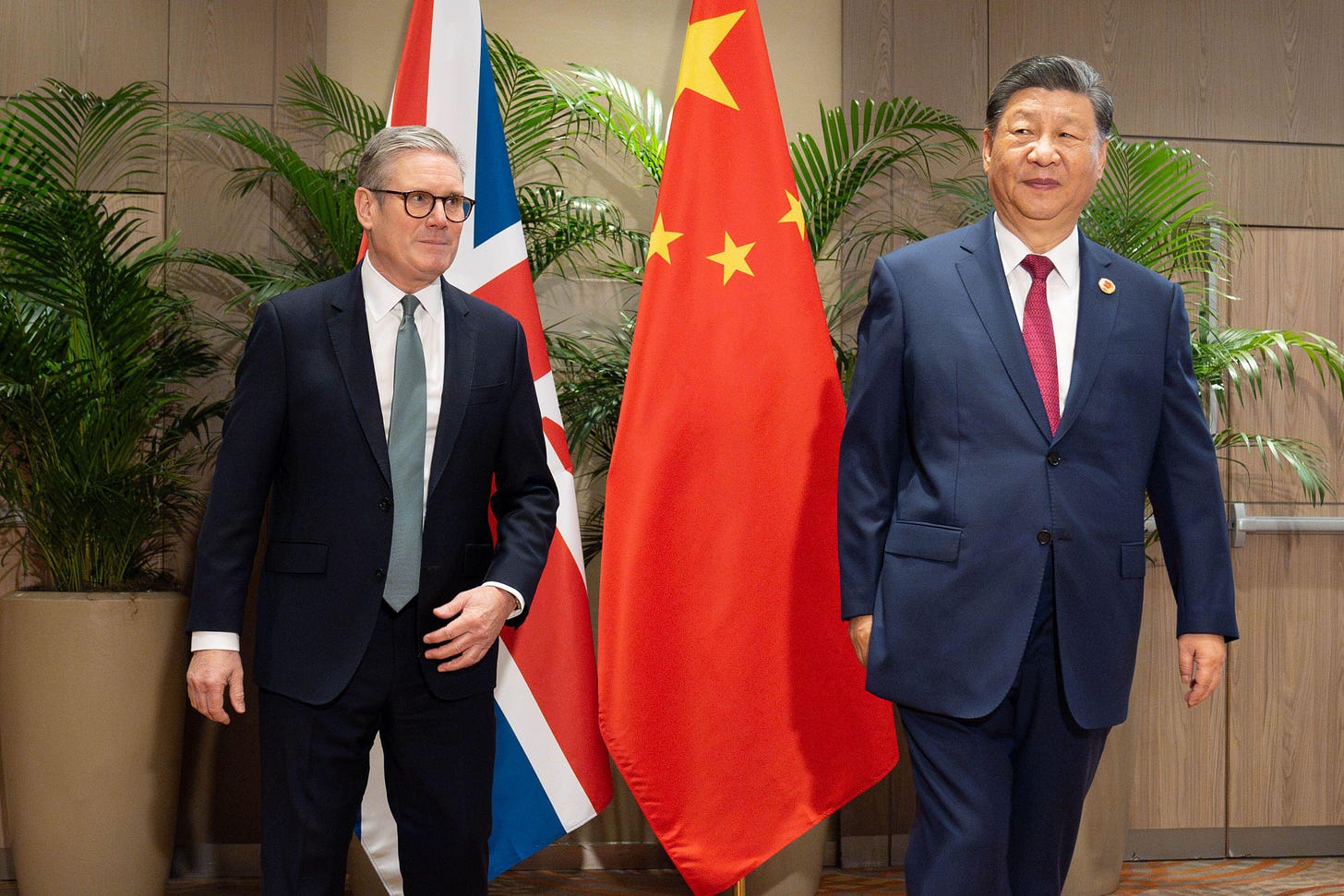Can Starmer juggle the demands of Xi and Trump?
Despite the well wishing intentionality of the meet, the jovial samba spirit of Rio De Janeiro failed to ignite the pair as stern expressions and rigid formality dominated the day.

Keir Starmer tentatively extended an olive branch to Xi Jinping today in a bilateral meeting during the G20 summit in Brazil. The face-to-face is the first of its kind since Theresa May greeted Xi more than six years ago.
Despite the well wishing intentionality of the meet, the jovial samba spirit of Rio De Janeiro failed to ignite the pair as stern expressions and rigid formality dominated the day. Starmer laid out his cautious vision of mutual cooperation, expressing a wish for “relations to be consistent, durable, respectful, and, as we have agreed, to avoid surprises where possible”.
Xi concurred and quipped that he respects Labour “working to fix the foundations of Britain”, cleverly employing the party’s mantra to signal goodwill to the nation’s new management.
The meet-and-greet was far from chummy though as the PM chose to challenge Xi on the deteriorating health of Jimmy Lai, a British-national and pro-democracy advocate detained for “threatening national security” in Hong Kong. After this contentious prodding, several British reporters were “aggressively ushered out” of the room by Chinese officials. Starmer also vouched for his Tory counterparts, Tom Tugendhat and Nus Ghani, who are being sanctioned by Beijing for speaking out against human rights abuses in Xinjiang.
Starmer avoided the most contentious territory, refraining from confronting Xi over Chinese espionage campaigns which have targeted the British Parliament, military and technology firms.
While the two were at odds over human rights and sanctions, both expressed interest in deepening economic ties as the UK suffers sluggish growth and China faces falling domestic consumption. Starmer’s side floated the option of reopening the UK-China Joint Economic and Trade Commission (JETCO), an initiative to boost bilateral investment and trade. Chancellor Rachel Reeves is expected to travel to China in the new year to iron out the details. The project has been inactive since the Conservatives axed it following Beijing’s brutal Hong Kong protest crackdown.
Optimism for a China-assisted economic renewal was overshadowed by the orange elephant in the room however. Donald Trump’s resounding election victory bodes ill for the global free market and if the incoming President’s most radical machinations come to be, the world economy could face an unprecedented contraction.
The UK will be one of the main victims of such a protectionist clash as analysts predict the Trump-proposed 60 per cent tariff on Chinese goods, and 20 per cent tariff universally – including UK goods – could wipe £20bn from the UK GDP by the end of Trump’s term, a nearly 1 per cent contraction.
Optimists believe Trump’s tariff agenda could prove to be a feint once again, as in his last term he passed on his most extreme proposals. Nevertheless, his second administration is shaping up to be even more hawkish on China than the first, and his base is fired up for trade war. Major economic confrontation appears inevitable.
With Trump looming over global politics, Starmer’s G20 meeting with Xi showcases the incredibly complex road that lies ahead for the UK. If the PM caters to the will of the City by facilitating greater Chinese investment, he may come closer to achieving the coveted, sustainable GDP growth. However, such a Faustian bargain could tarnish the human rights standing of the UK and is a poor signal to send to an adversary hell-bent on espionage.
Meanwhile, deepening ties with Xi could stain Trump’s perception of Starmer further, posing great risks to the already-fraught special relationship. Politics is an art, and lawyer-Keir may have to get creative if he is to cut this Gordian knot.
Josh Schlicht
Reaction Reporter
ON REACTION TODAY
Iain Martin
What could possibly go wrong?
Ian Stewart
UK housing trends bode ill for Britain's young
ALSO KNOW
Kremlin furious after Biden missile decision - A Moscow spokesperson has accused the US of “adding oil to the fire” after the outgoing Biden administration announced plans to permit Ukraine to use American long-range Atacms missiles against targets inside Russia. Putin has warned in past months that this decision would lead to “direct conflict” with the West.
French farmers protest EU trade deal - Thousands of farmers across France have taken their tractors to the streets today in protest over an EU trade accord between the bloc and Mercosur, a coalition of South American countries. The farmers believe the deal will lead to a surge of cheap, less-regulated agricultural imports which will undercut French produce and livestock sales.
Labour plans crackdown on children’s home profits - Companies running children’s homes in England will be prevented from bringing in “excessive profits” according to Labour’s education secretary. The changes aim to end “exploitative practices” within care homes and bring an end to price-gouging of local councils. Labour calls it the “biggest overhaul of children’s social care in England for a generation”.
British mining boss caves to Mali ransom demand, pays £126m - An Australian gold mining firm has agreed to pay £126m pounds to settle a dispute with the Malian regime after its top executive, a British national, and two others were detained early this month. Malian officials claim the trio were arrested for “tax violations”. The incident follows growing hostility across the Sahel towards Western business from pro-Russian coup governments.
Burglars target Windsor castle grounds - Masked trespassers managed to make off with two vehicles from the grounds of Windsor as the Prince and Princess of Wales slept nearby. The Royals were unharmed and police are currently investigating the incident.
FIVE THINGS
Curated by the Reaction Team - Josh Schlicht
Nasser’s Children, by Nigel Ashton in Engelsberg ideas
Britain’s farmers could revolt, writes Jamie Blackett in The Spectator
Big Oil is back, but at what cost? from the Financial Times
The profundity of evil, Douglas Murray in The New Criterion
Culture Wars: The Endgame by James Davison Hunter in The Hedgehog Review




